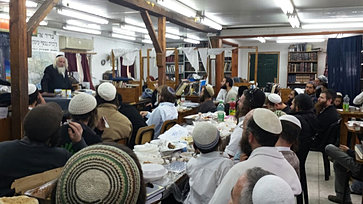 |
| Betzal'el and Oholiav working on the altar |
We don't value our teachers as we should. I don't think there is any class of professionals in our society who are as poorly thought of. (Well, okay...maybe used car salesmen...and politicians!) Because of this low estimation of teachers, people try to second-guess them and control them to unreasonable degrees. Thinking teachers to be extraneous, they look for alternative ways to acquire knowledge and skills that don't require attending class and listening to a teacher 'drone on.' And yet, if a child fails to do well in school, the child's parents and many others, are ready to blame the teachers. Remember 'No Child Left Behind,' signed into law by George W Bush? Teachers derisively referred to it as 'No Teacher Left Standing,' because it was premised upon the notion that it is incompetence among teachers, that causes children to fail to learn.
But this is not G-d's way. In this week's Torah reading, in the 35th chapter of the book of Exodus, verses 30 through 34, we find the following pronouncement:
G-d has selected Betzal'el son of Uri son of Chur, of the tribe of Judah, and has filled him with a divine spirit wisdom, understanding, knowledge and a [talent for] all kinds of craftsmanship. [He will thus be able] to devise plans, work in gold silver and copper, cut stones to be set, and do carpentry and other skilled work. [G-d] also gave to him and Oholiav, son of Achisamakh, of the tribe of Dan, the ability to teach [others].
Betzal'el and Oholiav have been selected to be the chief and deputy architects, respectively, and craftsmen of the Tabernacle and all its furnishings. But an inseparable part of their commission is to take the skills which they have so mastered, and teach them to others. They are to supervise the sacred construction, and do the most critical parts themselves, but they are also to raise up the next generation of craftsmen and designers, and parcel out to them parts of the work so that these students can, in turn, practice and hone their own skills. This is equally important to the actual work the two were to do themselves; as the Torah puts it, both the ability to design and craft, and to teach, are equally G-d-given.
The underlying statement is that teaching is an enterprise, whose importance cannot be minimized. Just as important as creating sacred objects and sacred space, is the effort to ensure that others will be able to do so in the future. Of course this text is talking about craftsmanship but the principle carried over to any kind of useful knowledge or skills. It is important to do, but the talented doer raises himself to an even higher level when he takes the time and energy to teach.
In Jewish thought, to teach someone is such a sacred task that one who teaches a student is considered the equal to that student's parents in importance. To teach someone is tantamount to giving them life.
 |
| Teacher and students in an Orthodox beis midrash(yeshiva study hall) |
And this is not to say that teachers should be put on a pedestal and automatically considered above reproach. Apart from an occasional misanthrope who finds his way into the teaching profession, there are also teachers who get burned out, and cynical, and yet remain in the classroom. Or who pepper their teaching with politics, as has been seen repeatedly in the USA especially during election seasons. And yes, there are a few teachers whose lack of competence calls into question their fitness to function in their profession. Teachers are important and should be respected and cherished, but that doesn't mean that they should escape reasonable scrutiny as to their fitness.
Disrespecting teachers is not the way to ensure our future, to take young minds and excite them about all kinds of knowledge. Teachers are not friers, but rather purveyors of a sacred trust. Let us learn to respect them for the centrality of that trust to the betterment of society. Let us encourage those possessing a particular wisdom, understanding, knowledge and talent to do, but also to take time to teach. Shabbat shalom.

No comments:
Post a Comment